Are Protein Bars Good For Breakfast?
Author:
Reviewed by:
(Certified Nutritionist, S&C specialist, M.Sc.Eng. Biotechnology)
Unlock your full potential by engaging with our experts and community! Have questions about your fitness journey or looking for expert advice on weightlifting techniques? Don’t hesitate — leave a comment below and Camila Parente Santos will provide a personalized answer and insights to help you reach your goals.
Torokhtiy is reader-supported. Some links are affiliate links, and we may earn a commission at no extra cost to you. See our disclosure page for details.
While a protein bar for breakfast can be easy when you’re busy, they typically don’t have enough micronutrients to be a full meal replacement. That’s why we recommend pairing them with foods rich in vitamins and minerals like fruits or smoothies to make them part of a complete breakfast.
Are Protein Bars Good For Breakfast? – Protein bars are a good breakfast option if you’re busy or out and don’t have access to other food. If possible, try pairing them with some micronutrient foods like fruit to make them a more complete meal replacement.
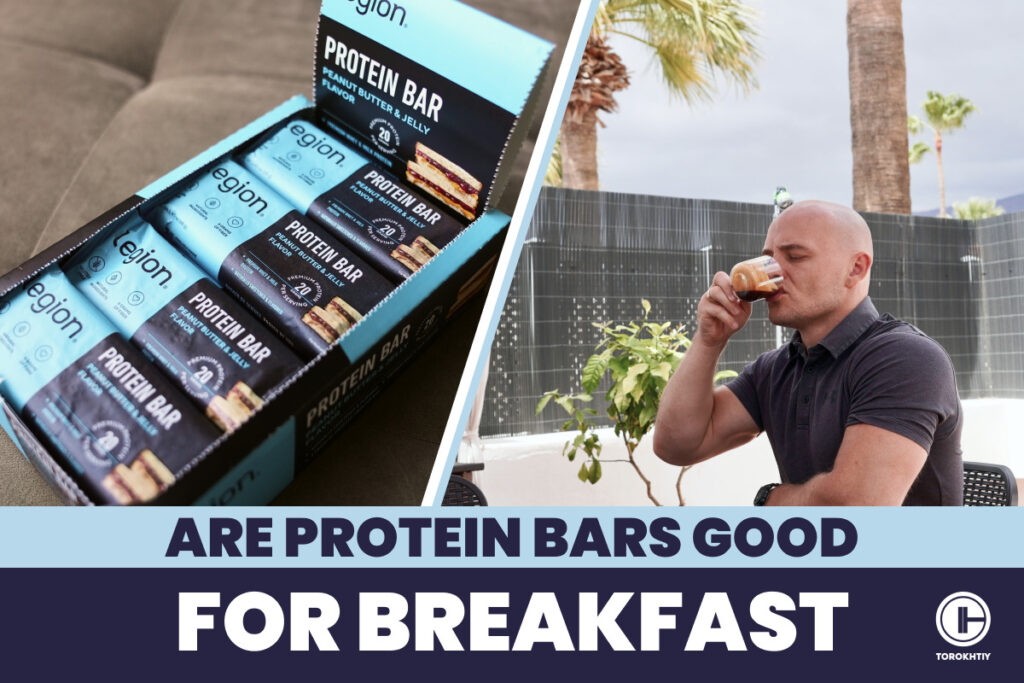
Are Protein Bars Good for Breakfast and Who Will Benefit From It?
So, can you eat a protein bar for breakfast?
Overall, protein bars are likely best used as part of a complete breakfast, as opposed to being a meal replacement in and of themselves. This is because protein bars typically don’t have very many vitamins or minerals, which are a crucial part of a complete meal.
So, while we don’t recommend protein bars as a standalone breakfast, they’re a great component of a larger breakfast. Because of this, we recommend pairing a protein bar in the morning with something like fruit or a smoothie that has plenty of micronutrients.
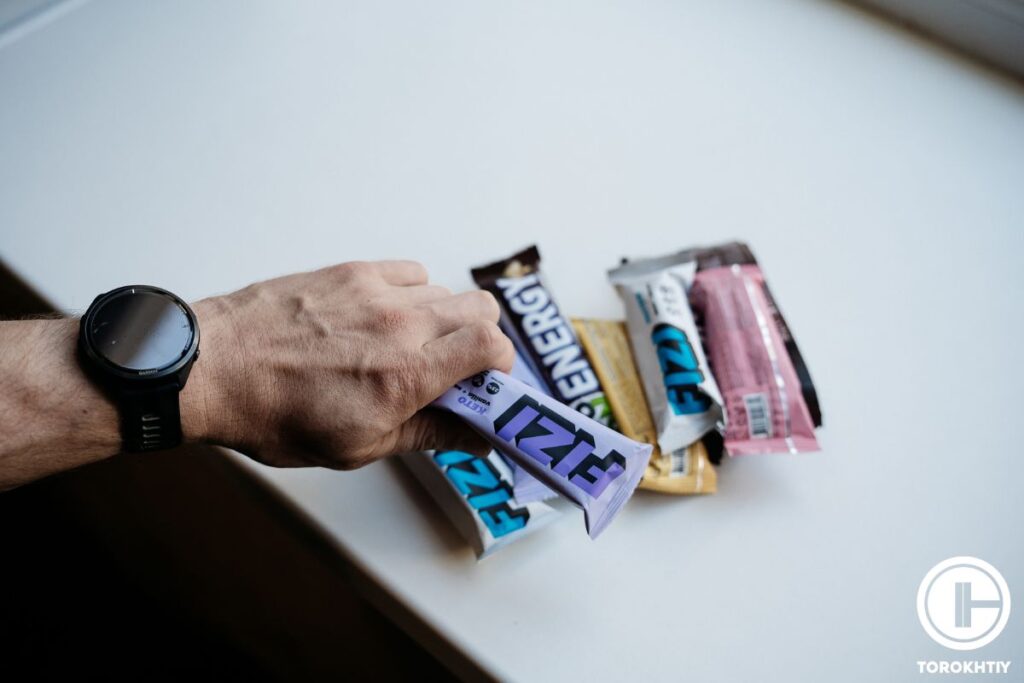
With that being said, if you’re busy or on the go, there are many worse options than a protein bar for breakfast. Additionally, if you’re bulking, protein bars can be a great way to get some extra calories in alongside breakfast. Likewise, if you’re cutting, protein bars can be a satisfying part of a light breakfast.
We’ll quickly cover each of these scenarios in more depth below.
1. You’re Busy or On The Go
The main time we recommend reaching for a protein bar at breakfast time is when you’re out, or don’t have time to make anything else. While it may not be the most complete or satiating breakfast option, it doesn’t get much easier than having a quick protein bar.
If you’re able to pair it with something micronutrient-dense – a banana, some berries, etc. – then that’s even better.
2. You’re Bulking and Need Extra Calories
Another example of protein bars being a great breakfast food is when you’re bulking and struggle to get extra calories in throughout the day. Of course, we don’t mean your entire breakfast should be a 250-calorie protein bar – instead, add it on top of your existing breakfast.
Including a protein bar on top of breakfast staples like oatmeal or eggs and toast can be a great way to boost the calorie and protein content of your breakfast. Just be sure the protein bar isn’t overkill, and that you’re staying within a daily caloric surplus of 250-500 calories.
3. You’re Cutting and Want a Light Breakfast
Finally, if you’re cutting and want a high-protein, low-calorie breakfast, the right protein bar paired with fruit would be a great option. Just be sure you’re choosing an option with relatively low calories, as well as low added sugar, and high fiber for added satiation.
What to Eat With a Protein Bar for Breakfast? (4 Options)
If you’re looking to start having protein bars for breakfast, as we’ve mentioned throughout this article, just make sure you’re pairing them with foods dense in micronutrients. Consider things like fruit, yogurt, oatmeal, or a smoothie, depending on your needs.
1. Fruit
Any kind of fruit would make a great, refreshing pairing to protein bars, as well as adding a ton of micronutrients to your meal.
Consider a banana or any berries you enjoy – better yet, combine several different kinds of fruit to maximize micronutrient intake. Whatever you choose, fruits are a great way to get varying micronutrients as well as added fiber.
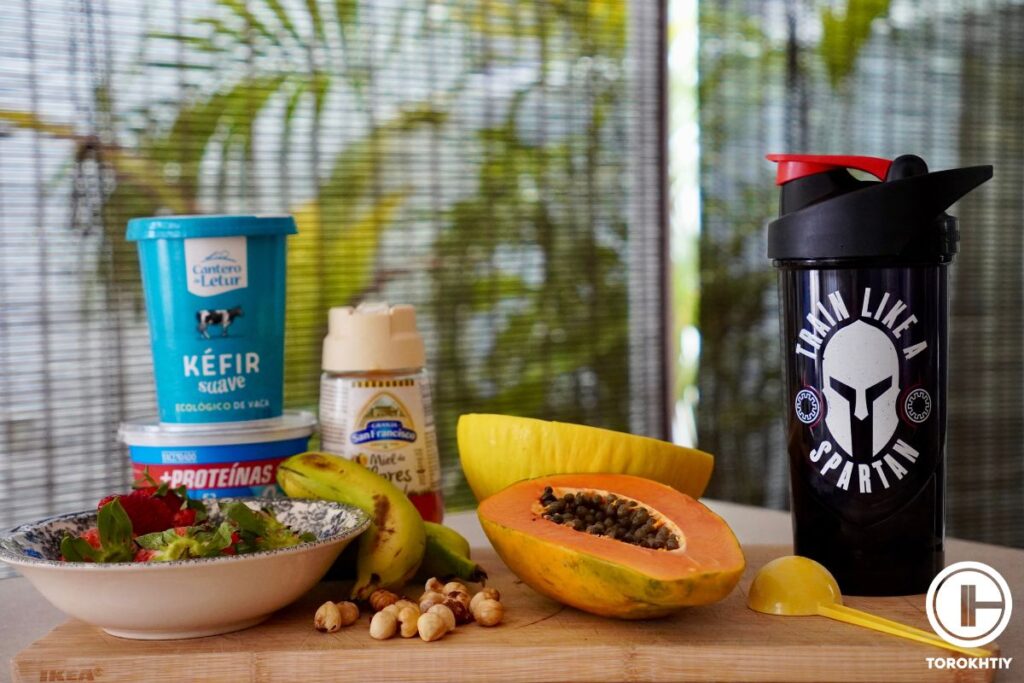
Some fruits are also an excellent source of polyphenols, which act as antioxidants in the body, on top of other health benefits like disease prevention and recovery from exercise. If you’re interested in polyphenols, reach for some blueberries, cherries, strawberries, or blackberries.
2. Greek Yogurt
If you’re looking for even more protein on top of your bar, another excellent option is Greek Yogurt, which is packed full of calcium and B Vitamins. Bonus points if you add some fruit on top for more added fiber and micronutrients!
3. Oatmeal
Another breakfast staple that would pair great with a protein bar is oatmeal. These are another excellent source of fiber and carbs in general. They’re also full of micronutrients including phosphorus, thiamine, magnesium, and zinc.
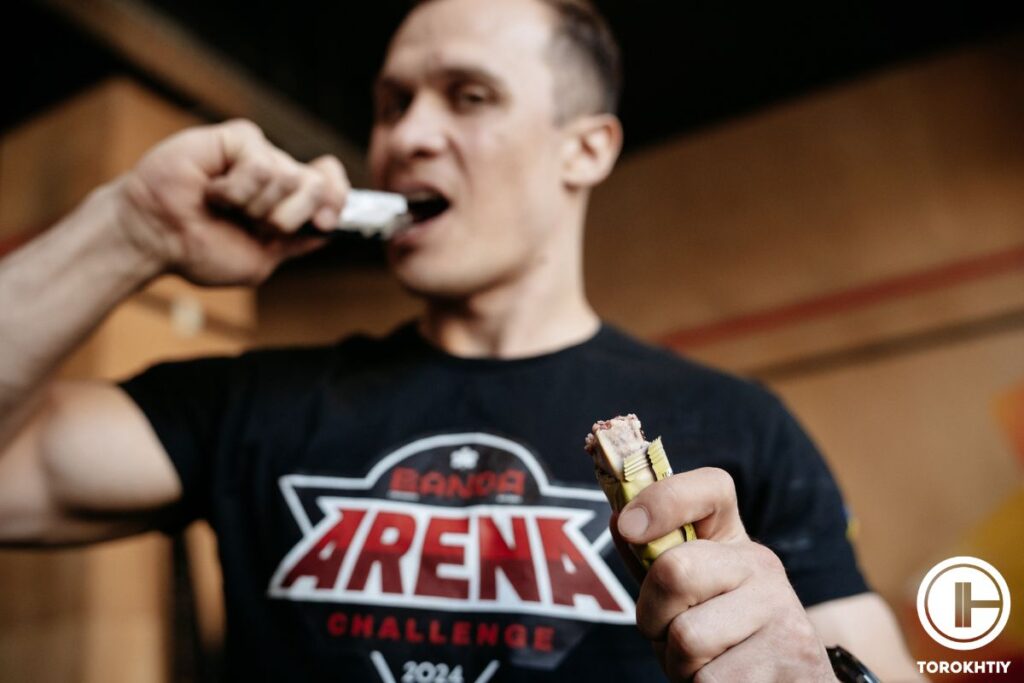
Especially when combined with seeds and nut butter, oatmeal can be a great high-calorie bulking breakfast – made even higher-calorie with the addition of a protein bar. Once again, this could easily be paired with fruits for extra fiber, vitamins, and minerals.
4. Smoothie
Finally, an easy way to combine ingredients for a complete breakfast is to make a smoothie! Smoothies are a great way to combine micronutrient-dense ingredients like fruits along with excellent sources of protein like Greek Yogurt or whey protein powder.
Also, if you’re in a rush, a smoothie is easy to take on the go alongside a protein bar, making it the perfect partner for a complete breakfast.
Transparent Labs Protein Bars
- Protein Source: Grass-Fed Whey Protein Isolate
- Flavors: Peanut Butter Chocolate Chip
- Vegan: No
- Protein per bar: 15g
- Fats ber bar: 16g
- Carbs per bar: 23g
- Fiber per bar: 3g
- Added Sugar: 5g
- Sugar Alcohol: No
- Calories per bar: 280
- Sodium per bar: 280mg
- Bars per Package: 12
- Bar Weight: 60g
- Price per bar: ~$3.33
- Recommended by Athletes: Hafthor Bjornsson, Paul Sklar, Sean Harris
Whether you plan on using a protein bar as a standalone snack or as part of a more complete breakfast, choosing a high-quality option is necessary. That’s why we recommend the protein bars from Transparent Labs.
This is a slightly higher calorie bar with 280 calories per serving, making it well suited to those who want a more satiating breakfast option or those who want the calories for their bulk. It contains 15g of protein per serving, as well as a decent 3g of fiber.
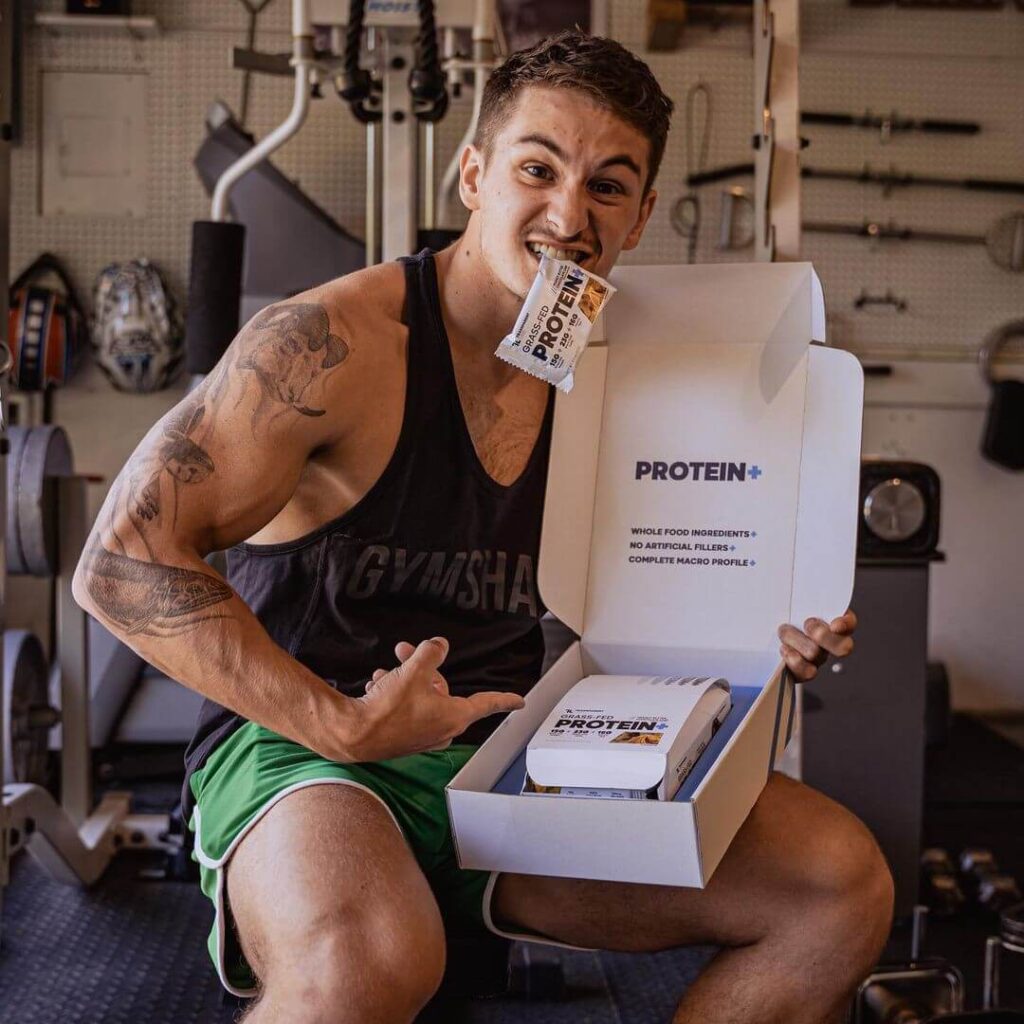
Keep in mind that this bar barely contains any micronutrients, making it important to pair with something nutrient-dense if you want to use it as a meal replacement.
Overall, this is a very high-quality bar, made with grass-fed dairy, containing no artificial ingredients whatsoever. However, the price reflects the quality, being fairly expensive at ~$3.33 per bar. Still, in our opinion, this is one of the highest-quality bars on the market.
FAQ
Is a Protein Bar for Breakfast Good for Weight Loss?
It depends. As long as a protein bar is paired with some other micronutrient-dense foods like fruit, it can be a good option for meal replacement. However, eating a protein bar on an empty stomach may not be enough to keep you satiated for long. Still, when paired with fruit, this is an easy low-calorie meal option for breakfast.
What Time Should You Eat a Protein Bar?
We mainly recommend saving protein bars for when you’re busy or on the go. Otherwise, try to prioritize whole foods in your diet instead! With that being said, there’s no wrong time to eat a protein bar if it’s the most convenient option for you at the time.
Can You Eat a Protein Bar as a Meal?
Protein bars don’t have very many micronutrients, which makes them less suitable as meal replacements. They are also fairly low-calorie. However, when combined with other micronutrient-dense whole foods, protein bars can be part of a solid meal.
Conclusion
Protein bars can be a good breakfast option, especially if you’re busy or on the go. With this being said, we recommend pairing them with micronutrient-dense whole foods whenever possible so they become part of a more complete meal.
However you plan on using protein bars, we recommend choosing a high-quality option like those available from Transparent Labs.
What’s your opinion on eating protein bars for breakfast? Do you combine them with anything? Let us know your thoughts in the comments below.
Also read:
- Do Protein Bars Give You Gas? Here’s What to Avoid
- How Many Protein Bars A Day? When is it Too Much?
- Do Protein Bars Make You Gain Weight?
- Why Do Protein Bars Taste Bad?
- Is It Bad To Eat Protein Bars Without Working Out?
- Protein Bars vs Shakes: The Guide You Need
- Is It Bad to Eat Protein Bars Everyday
References:
- The Nutrition Source, “Added Sugar”, Harvard T.H. Chan School of Public Health, https://www.hsph.harvard.edu/nutritionsource/carbohydrates/added-sugar-in-the-diet/ (Accessed May 6, 2024)
- The Nutrition Source, “Fiber”, Harvard T.H. Chan School of Public Health, https://www.hsph.harvard.edu/nutritionsource/carbohydrates/fiber/ (Accessed May 6, 2024)
- Emily Nock, “What are Polyphenols? Another Great Reason to Eat Fruits and Veggies” Colorado State University: Kendall Reagan Nutrition Center, https://www.chhs.colostate.edu/krnc/monthly-blog/what-are-polyphenols-another-great-reason-to-eat-fruits-and-veggies/ (Accessed May 6, 2024)
- The Nutrition Source, “Yogurt”, Harvard T.H. Chan School of Public Health, https://www.hsph.harvard.edu/nutritionsource/food-features/yogurt/ (Accessed May 6, 2024)
- The Nutrition Source, “Oats”, Harvard T.H. Chan School of Public Health, https://www.hsph.harvard.edu/nutritionsource/food-features/oats/ (Accessed May 6, 2024)
- Photos made by Torokhtiy Media Team.
Why Trust Us?
With over 20 years in Olympic weightlifting, strength training, nutrition coaching, and general fitness our team does its best to provide the audience with ultimate support and meet the needs and requirements of advanced athletes and professional lifters, as well as people who strive to open new opportunities and develop their physical capabilities with us.
By trusting the recommendations of our certified experts in coaching, nutrition, and sports training programming, as well as scientific consultants, and physiotherapists, we provide you with thorough, well-considered, and scientifically proven content. All the information given in the articles concerning workout programming, separate exercises, and athletic performance, in general, is based on verified data.
The product testing process is described in more detail here.
Camila has worked as a Nutritionist for 7 years. In addition to being a nutritionist, she is an amateur weightlifting athlete for 2 years. Camila has experience at Flamengo’s football base and in a food supplement company and currently provides services at a clinic. At the moment she is coursing a postgraduate study in Sports Nutrition.
Reviewed by: Jacek Szymanowski
Certified Nutritionist,
M.Sc.Eng. Biotechnology
Performance architect,
Strength and Conditioning Specialist
With over 30 years of fighting experience, specialization in nutrition coaching for athletes, and expertise in metabolic health and dietary strategies, Jacek offers a comprehensive approach to optimizing your performance and well-being. Backed by a Master of Science degree in Biotechnology, Jacek remains at the forefront of scientific advancements, ensuring that his coaching is always evidence-based and up-to-date.




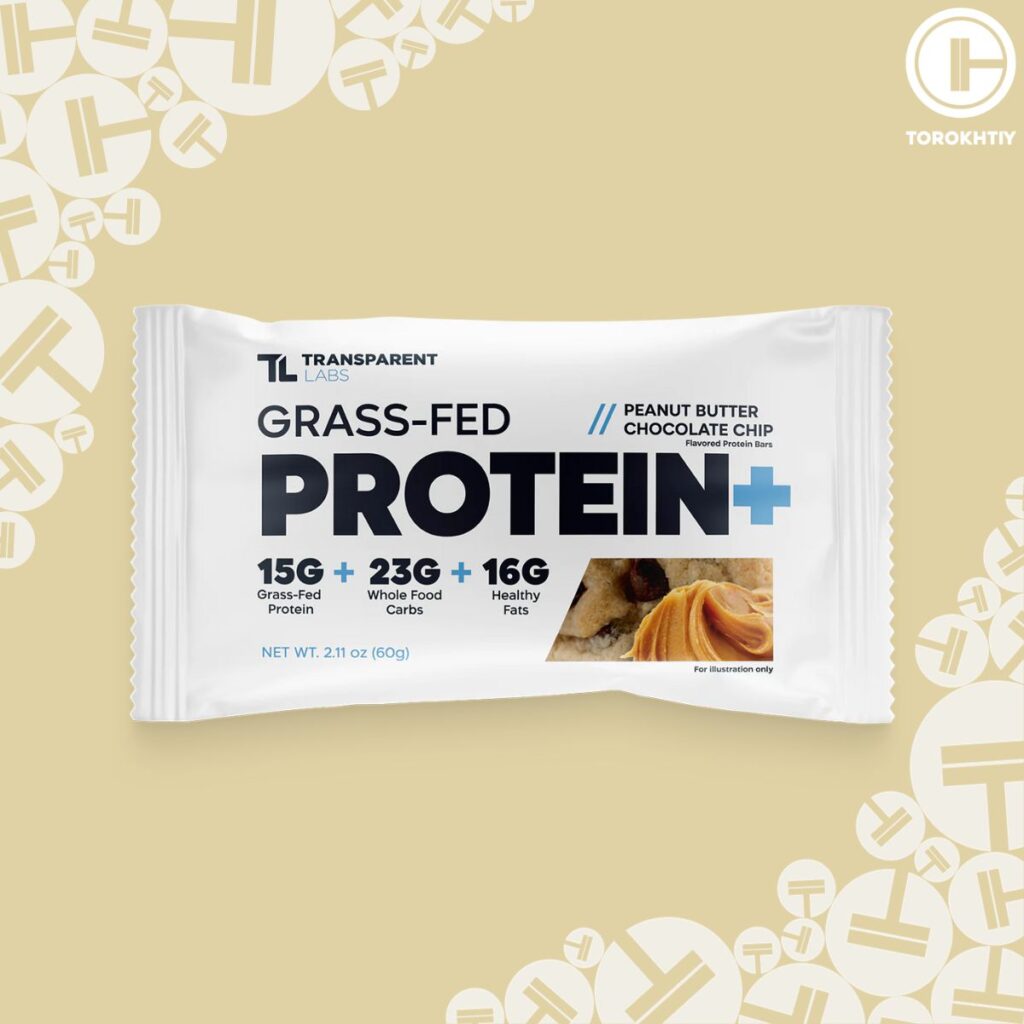
Still have questions after reading our article? Unlock your full potential by engaging with our experts and community! Don’t hesitate — leave a comment below and Camila Parente Santos will provide a personalized answer and insights to help you reach your goals.